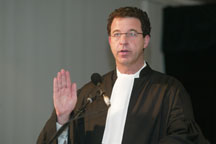 BEIRUT- A pro-Syrian group that claimed it killed a Lebanese editor has threatened to kill the next head of the UN commission investigating the assassination of former Prime Minister Rafik Hariri, the editor
BEIRUT- A pro-Syrian group that claimed it killed a Lebanese editor has threatened to kill the next head of the UN commission investigating the assassination of former Prime Minister Rafik Hariri, the editor
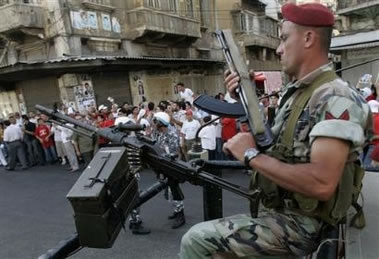 BEIRUT, 29 December (IRIN) – The Lebanese government has increased the presence of security personnel throughout the country ahead of New Year’s celebrations, following threats and a series of bomb attacks this year. "We have doubled our patrols," said an official from the Beirut police who wished to remain anonymous. "From 700 staff we went up to 1,400," he added. Temporary checkpoints have been installed throughout the capital and night and day patrols have been brought up from 8 to 25, with 311 officers patrolling at night.
BEIRUT, 29 December (IRIN) – The Lebanese government has increased the presence of security personnel throughout the country ahead of New Year’s celebrations, following threats and a series of bomb attacks this year. "We have doubled our patrols," said an official from the Beirut police who wished to remain anonymous. "From 700 staff we went up to 1,400," he added. Temporary checkpoints have been installed throughout the capital and night and day patrols have been brought up from 8 to 25, with 311 officers patrolling at night.
Israeli warplanes have struck a Palestinian militant base in southern Lebanon. Two Palestinian were reportedly injured in the raid. The air strike followed a rocket attack against two Israeli towns near the Lebanese border. Israeli aircraft struck a base belonging to the Popular Front for the Liberation of Palestine General Command, a small pro-Syrian Palestinian militant group based in Naameh, about eight kilometers south of Beirut.
The strike followed a series of rocket attacks Tuesday night against the Israeli town of Kiryat Shmona and the nearby village of Shlomi. The area is a frequent target of rocket attacks from Lebanese territory. A spokesman for the Palestinian group targeted in Wednesday’s strike denied his group’s involvement in the rocket attacks. Most attacks against northern Israel are carried out by the Islamic militant group Hezbollah, but a Hezbollah spokesman also denied involvement in the latest rocket attacks.
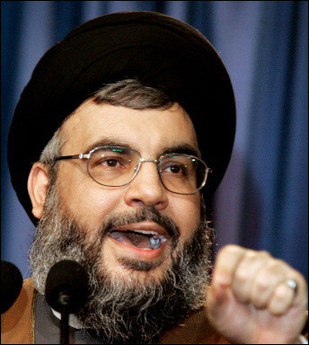 Lebanese Minister of Energy And Water, Mohammed Fneish, underlined Sunday importance of preserving "the distinguished relation with Syria .. To fortify Lebanon against foreign interventions and against the Israeli danger we must have good ties with Syria," Fneish said in political symposium in Shqra town, shorthorn Lebanon.
Lebanese Minister of Energy And Water, Mohammed Fneish, underlined Sunday importance of preserving "the distinguished relation with Syria .. To fortify Lebanon against foreign interventions and against the Israeli danger we must have good ties with Syria," Fneish said in political symposium in Shqra town, shorthorn Lebanon.
The minister stressed that those who want to create disagreement with Syria, they definitely want to weaken Lebanon.Head of al-Wafaa Bloc for the Lebanese Resistance at the Lebanese parliament Mohammed Raad called upon all political powers in Lebanon for a national dialogue including all on national issues on top of which are relation with Syria, preserving the resistance and its weapon as well, as revealing the truth about the crime that claimed the life of Lebanese ex-Prime Minister Rafiq al-Hariri. The Lebanese MP called all sides to take their stances and decisions away from the "illusions of international support and interference."
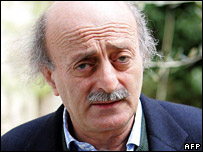 The Lebanese Druze leader and parliamentarian Walid Junblat launched an unprecedented criticism against the Lebanese Hizbullah party. During his meeting with a people delegation in his house in Mukhtara in Mount Lebanon, he called on Hizbullah to prove his commitment to Lebanon first ahead of his cling to the alliance with Syria," according to al-Jazeera satellite TV.
The Lebanese Druze leader and parliamentarian Walid Junblat launched an unprecedented criticism against the Lebanese Hizbullah party. During his meeting with a people delegation in his house in Mukhtara in Mount Lebanon, he called on Hizbullah to prove his commitment to Lebanon first ahead of his cling to the alliance with Syria," according to al-Jazeera satellite TV.
Junblat’s statement was made on the background of statements made on Saturday by the secretary general of the Lebanese Hizbullah party Sheikh Hassan nasrullah to al-Manar TV channel in which he said "to the one who want to take us to a war with Syria, we say that the first looser of this war is Lebanon." Worthy mentioning that relations between the two sides- on opposing sides concerning relations with Syria, remained steadfast until the assassination of Gebran Tueni when Junblat and Syria’s opponents accused Syria of being behind it.
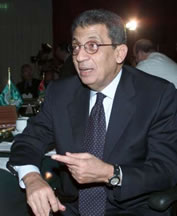 By BENNY AVNI – Staff Reporter of the Sun, UNITED NATIONS – The Arab League’s secretary-general, Amre Moussa, tried recently to mediate between Syria and Lebanon, reportedly offering to end a Syrian assassination campaign against Lebanese journalists and politicians. Diplomats and editorialists in the region said over the weekend that the effort, which was perceived in Lebanon as an attempt to defend Syria, backfired and highlighted the league’s weaknesses.
By BENNY AVNI – Staff Reporter of the Sun, UNITED NATIONS – The Arab League’s secretary-general, Amre Moussa, tried recently to mediate between Syria and Lebanon, reportedly offering to end a Syrian assassination campaign against Lebanese journalists and politicians. Diplomats and editorialists in the region said over the weekend that the effort, which was perceived in Lebanon as an attempt to defend Syria, backfired and highlighted the league’s weaknesses.
Yesterday, Mr. Moussa officially denied ever relating a Syrian offer to end assassinations in Lebanon. Reports in the Lebanese press over the weekend were "completely unfounded," Mr. Moussa said in a statement, denying that upon arriving from Damascus in mid-December he relayed an offer that Syria would completely cease an assassination campaign if the Lebanese government ignores U.N. Security Council resolution 1559 and ends its support of the U.N. probe into the assassination of a former Lebanese prime minister, Rafik Hariri.
BEIRUT, Lebanon, Dec. 27 (UPI) — A Syrian national was arrested in Beirut on Tuesday in connection with the bombing that killed anti-Syrian journalist Gibran Tueni 15 days ago. Judicial sources said Abdul Qadir Abdul Qadir, who rents a plot of land near where Tueni was killed, was being questioned about phone calls he made […]
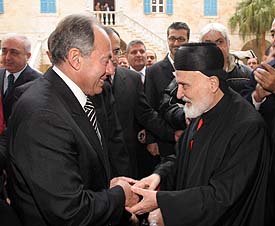 Daily Star, Lebanon’s influential Maronite Patriarch advised President Emile Lahoud to restore the presidential position to its former significance saying that "history will record the stand that you, the president, will take for the sake of the nation." During Christmas Mass at Bkirki Sunday, attended by the president in the front row, the prelate indirectly suggested that Lahoud should reconsider whether remaining in office would serve the interest of the country and the reverence of the presidential post.
Daily Star, Lebanon’s influential Maronite Patriarch advised President Emile Lahoud to restore the presidential position to its former significance saying that "history will record the stand that you, the president, will take for the sake of the nation." During Christmas Mass at Bkirki Sunday, attended by the president in the front row, the prelate indirectly suggested that Lahoud should reconsider whether remaining in office would serve the interest of the country and the reverence of the presidential post.
For the first time, Sfeir – who unofficially has the last word on who becomes the next president – publicly implied that he backed Lahoud’s early departure from office. "It is your responsibility, your Excellency, as the head of state, to lead Lebanon and the Lebanese to safety and preserve the Constitution and national unity. "If the president is not up to the task, then it is up to him to judge whether remaining in his post or resigning would honor this position or dishonor it."
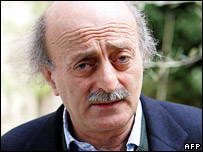 Lebanese Druze leader Walid Jumblatt has accused Syria of terrorising Arab countries and has urged the head of the Arab League, Amr Moussa, to intervene. Mr Jumblatt, Lebanon’s most prominent anti-Syrian politician, said Syria was "taking the path of terrorism in order to evade international pressure". He said Mr Moussa "must go to Damascus to stop the murders in Lebanon". A UN inquiry has implicated Syrian officials in the killing of former Lebanese PM Rafik Hariri in February.
Lebanese Druze leader Walid Jumblatt has accused Syria of terrorising Arab countries and has urged the head of the Arab League, Amr Moussa, to intervene. Mr Jumblatt, Lebanon’s most prominent anti-Syrian politician, said Syria was "taking the path of terrorism in order to evade international pressure". He said Mr Moussa "must go to Damascus to stop the murders in Lebanon". A UN inquiry has implicated Syrian officials in the killing of former Lebanese PM Rafik Hariri in February.
Many Lebanese also blame Syria for the murder of the anti-Syrian journalist and MP, Gibran Tueni, earlier this month. Damascus has denied any involvement in either killing. ‘We will not cave in’ Mr Jumblatt charged that Syria controlled a variety of "instruments and terrorist factions capable of scaring Arab regimes", in an interview with the Lebanese satellite channel LBCI. He told Lebanon’s Daily Star newspaper that "we have received several messages threatening public bombings, and our response to that is that we will not cave in under their terrorist ways".
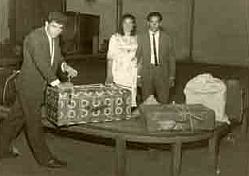 In the Bekaa Valley region, there are cities where Brazilian culture is present in most houses. This happens because of the return of immigrants that married and had children in Brazil. ‘When I arrived in Lebanon I had to take private classes to learn Arabic,’ said Mohamed Abdul Fattah, who was born in S
In the Bekaa Valley region, there are cities where Brazilian culture is present in most houses. This happens because of the return of immigrants that married and had children in Brazil. ‘When I arrived in Lebanon I had to take private classes to learn Arabic,’ said Mohamed Abdul Fattah, who was born in S
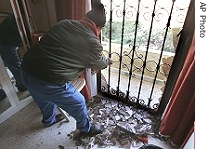 By Jim Teeple,
By Jim Teeple,


